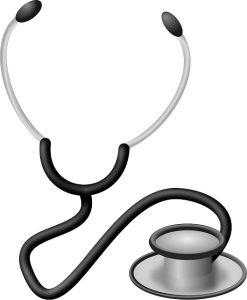One thing that always seems to be a big financial stresser is medical bills. You don’t choose when and where you get hurt or sick and you can’t very well ignore chest pains or a broken bone. Even with insurance medical bills can be overwhelming. If you find yourself with mounting medical debt or are expecting a big medical bill (labor and delivery for instance) here are some suggestions to prepare yourself for the future or help you if you’re already buried in medical debt.
Planning ahead:
–If your employer offers health insurance and you can afford it, do it. If you can get a secondary insurance under your spouse without too much money, this can be a good idea too. Then when one insurance won’t pay, it’s possible the secondary could pick it up if it’s a covered expense.
–Flexible healthcare spending accounts. This can be a way to manage debts you anticipate such as regular doctors appointments, prescriptions, or ongoing medical supply needs such as glucose test strips, etc. Some employees and even banks offer flexible healthcare spending accounts. You can specify an amount per paycheck to be taken out and put in the account. $5 per pay, $20 per pay, whatever you like. Then when you pay a medical bill, buy medial supplies, or fill prescriptions you turn your receipts in to get the cash from your flexible spending account. The downfall is, even though, it’s your money, you must use what’s in the account every year or you lose it. So you probably don’t want to overestimate how much you put in there.
–Supplemental insurance policies. There are more and more supplemental insurance companies out there. They are not health insurance but it’s a policy you pay into to help cover expenses later in the event of a medical issue. Companies like AFLAC and Lincoln, for example, offer policies that will pay you cash payments depending on your situation. They can also help pay for expenses insurance doesn’t cover, hotel stays, travel to specialty treatments centers, etc.
–Savings accounts, this can be said for anything in life, not just medical expenses. All the financial experts recommend having enough money in your savings account to cover in the event of loss of job or hardship. Depending on which one you follow, they recommend anywhere from 6 months to 1 year worth of salary in savings. I know this seems a bit impossible for those of us that are living paycheck to paycheck. Consider opening a savings though and depositing even $5 a paycheck and leave it in there. Let interest work for you to give you some free money. You never know when you might needs some money for unexpected medical bills, car repairs, etc.
–If you’re employer doesn’t offer insurance or you can’t afford it you can see if you qualify for free or low cost health insurance at healthcare.gov. Some states also have programs for children. One example would the the CHIP program in Pennsylvania.

Dealing if you’re already under medical debt:
–First make sure all the charges are valid. It’s easy, when you’re getting bill after bill, to think you actually do owe it. Just from personal experience, we had a bill that my husband paid. Thankfully he wrote down the account number and kept the stub. They kept sending us bills threatening to send up to collections. He called several times and had to raise a little heck but after several people looking at it. It was a mistake in their computer billing system and we had, in fact, paid it.
–See if the medical facility you’re receiving the bill from has a payment plan. Some may even offer financial assistance or hardship programs if you qualify.
–If you’re already under collections make payments the best you can, even if you only send $5 per bill. You’ll be making an effort to pay. Yes they can still send you to collections even with making small payments.
–See if the debt collectors will settle. Debt collectors are hired by the companies you are in debt to. They want to collect the money. Sometimes debt collectors will settle a debt for a fraction for the original full amount. Do be honest with them. Tell them your situation and what you think you can actually pay. If it’s $10/month tell them that. Debt collectors are not allowed to harass, threaten you, or use obscenities when talking to you. For consumer information on what debt collectors can and can’t do you can check out the FTC government site on debt collection.
–Borrowing money from whole life insurance policies – This only works for whole life insurance policies and not term life insurance policies. Depending on how long you’ve had your whole life policy, how much it’s for, and the terms of your provider you can borrow money from your whole life insurance policy. This is a better option than taking out a loan or using a cash advance.
Last Resorts
Ok so maybe you tried all this stuff and you’re in a spot that none of this can fix. There are options. I do NOT recommend these unless you have no other choices
–Bankruptcy , I know that’s a dirty word. But for someone who is in way over their heads with no relief in site, this can at least relieve some stress. Chapter 7 wipes out all qualifying debt but if you own a home or cars that you’re behind on you could risk losing those. Chapter 13 combines all your debt and gives you a settlement payment you must pay each month. It’s a fraction of what the normal debt monthly payments would be. This one allows you to keep your house and cars but you will have to make monthly payments. It’s kind of a reset on your payments.
—Selling life insurance policies, again I don’t recommend this unless you absolutely have to. Yes you can sell life insurance policies,the link at the beginning of this listing give you information. You can get money to help pay debts but it also means your loved ones will no longer receive any benefits upon death.


